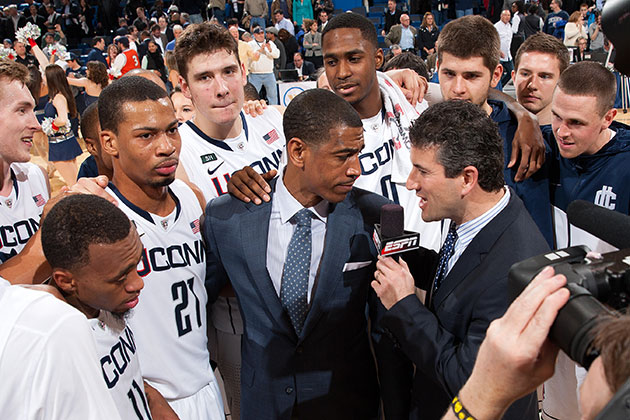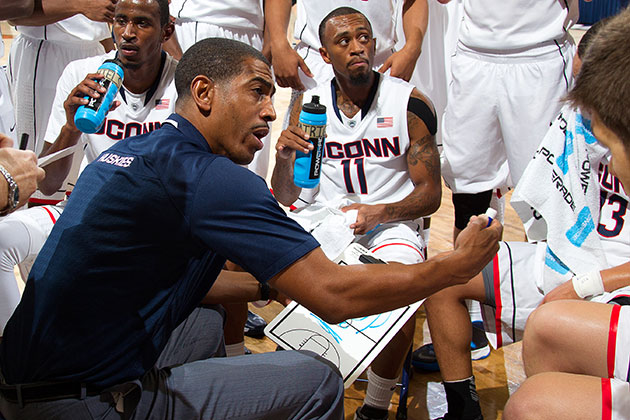As the Men’s Basketball team takes on Iowa State at Madison Square Garden in the NCAA Sweet Sixteen this evening, UConn Today takes a look back at Head Coach Kevin Ollie’s words as he prepared for the 2013-14 season. This article was first published on Oct. 31, 2013.

Kevin Ollie ’95 (CLAS) was named the Huskies 18th men’s basketball head coach on Sept. 13, 2012 and led the team to a 20-10 record in the 2012-13 season. He spent the previous two years as an assistant to Hall of Fame coach Jim Calhoun, following a 13-year career in professional basketball. He received the 2013 Ben Jobe National Coach of the Year Award at the Final Four in Atlanta, which is presented to the top minority coach in Division I basketball who has produced the best results from his team under adverse or otherwise difficult conditions.
As he prepared for the 2013-14 season, he spoke with UConn Today.

When did you decide that you wanted to be a coach?
I always wanted to be a coach, even when I got here as a student. I just didn’t know all the detail and hard work it took. [As players] we came in here and did two or three hours a day of practice and it was done. Going on the other side, seeing the preparation, time, travel, recruiting; then you bring in your family and have to have balance with them. It gave me a deeper appreciation of all of my coaches, not just Coach Calhoun.
Being a point guard, I was providing instructions from my coach to the players. I not only had to know my position, I had to know everybody else’s position on the court. So I always found myself in that role as a point guard. I didn’t have all the talent in the world. I had to study, look at the game tapes. It wasn’t like I was Allen Iverson. I had to really break down my opponent. It allowed me to be a better student of the game and understand offensive sets, the defensive and offensive tendencies of my opponents and the teams, and what coaches are trying to do in certain situations.
In the NBA, there are way more situations than college. You really sit down and see how the coaches execute in those different game situations. It really allowed me to have a wealth of knowledge. Then with getting cut, traded, and having 10-day contracts, I’ve been around some of the greatest coaches to ever grace the sidelines. That’s a blessing, also.
It’s often mentioned that you had to work hard to stay in the game as a professional. It seems that served you very well during your first year, because there was a lot of uncertainty and you had a limited contract. Does it make sense that is how it worked out?
You can’t control events, but you can control the meaning of events. That’s how I look at life. Yeah, we weren’t going to the NCAA Tournament, but that doesn’t tell us we can’t play hard for the University of Connecticut. No one can take away from what our team had to endure. Nobody’s ever going to forget about the legacy they left, the heart they played with. Everybody will identify with that team. That’s something nobody can take away from us. Every time I got cut, I saw it as another opportunity for me to come back and keep building on what I’m trying to leave, which is a positive legacy for my family to be proud of everybody I touched throughout this journey.
You’ve often talked about life being a journey. You became a head coach sooner than expected. What made it happen so soon?
I know God had a big part in it. Coach Calhoun falling off of a bike and breaking his hip gave him an opportunity to reflect and step away. I think he came to the resolution that this was the best time for him to step down and that I could be the person, with the collective staff, to be a replacement going forward and we could keep this program to the level where he would be satisfied. God already had it orchestrated.
What did you learn from this experience last year?
You’ve got only 24 hours in a day and the way you are successful is how you use those 24 hours. Everybody’s pulling at you; you have to know time management. You can’t take days off. You can’t make excuses. You’ve got to get the job done. That’s what I try to teach our guys. When we got hurt at the end of the season and we had our last game against Providence, I said: This is the team we’ve got. We’re not making any excuses. We’re going out there and playing the UConn way. We’ll figure out a way to play together as one unit. You can rest your mind, but you can’t sleep. I told them that last year, and I think it really resonated in their hearts. If you want it, you really have to prioritize what’s important and what’s giving you opportunities to make your dream a reality. You’ve got to identify those things.
What surprised you about last season?
That first game in Germany; just how the guys came together. It was a tough trip, but that first practice they just locked in. It was just great to see the bonding. What a great trip. We were able to see soldiers and Air Force men who are the same age as our kids, and they were able to see what I’ve been talking about in a lot of team building workshops we did before practice, when we talked about sacrifice. I didn’t have to talk about it anymore. I said: Look at these guys, understand their stories and live through them vicariously for a couple of days. They’re giving their life so you can walk around and dribble the basketball and go to class. These guys are giving you the freedom to do those things. We came out and played like gangbusters and won against Michigan State, a ranked team. It was the only trophy we got last year.

Did you feel any pressure last year?
I just wanted to be myself. People were saying, how are you going to replace Jim Calhoun? I’d say: I’m sorry to say I can’t replace him. I don’t care what I do, even if I win four national championships, I still can’t replace him. He came here when there was nothing, and he built [this program]. I can’t replace him, but I can be the best Kevin Ollie. That’s what I’m going to try and give this University. I love this University. It’s the only brotherhood I know. Those pressures were from the outside, but it never got to me. A lot of people don’t say, I don’t know. They think it’s a weakness. I think if everybody said it sometimes, this world would be a better place. I told Coach Calhoun, I’m going to need your help. I told my coaching staff, I’m going to need your help. Certain areas I’m weak in and you’re going to make me strong. I identified those, just like with my team. We believed in each other; it was a unity of purpose.
The team was competitive last year, with just a couple of losses with wide margins, and you were able to win several overtime games. Was it the faith the kids had in themselves or you that you had in them?
It was blind trust that they had in one another. When they were in the situation and it was crucial that they needed to play, they had blind trust in Shabazz [Napier ’14 (CLAS)] that he could make [the shot]. Shabazz had blind trust that Philip [Nolan ’16 (CLAS)] or De’Andre [Daniels ’15 (CLAS)] could get the rebound and give him the outlet pass. It was a collective, group effort. We were playing for pure love of the game. I think that’s what allowed us in crucial situations when most teams separate, our team came together. It was quite a thing to see. There were some games when I was in the press room looking at the stat sheet and I wanted to tell you guys, but I couldn’t: I don’t know how we won that game. You get outrebounded by 31, we win in overtime. It was a remarkable time.
Did you learn something about yourself this past year that surprised you?
I’m learning every day. I think when you stop learning, you die. I think when you stop contributing, you get eliminated. Every day I’m learning just little things. I’m an empty cup. I think that’s what will allow me to, hopefully, become a great coach and an even better leader. I don’t know it all. I’m not afraid to tell anybody that. I collect information and a make a decision. I don’t live life with regrets. People understand that, too.
Like most coaches, you are becoming a bit of a philosopher.
It’s the question I always ask myself each morning: What do I need to know that I don’t know right now? Because I better find out. I want to figure it out. There’s a lot of stuff I don’t know, but I better ask somebody. A lot of people in L.A. [where I grew up] didn’t know what I knew, because I got out of there. There are a lot of people on the same corner doing the same thing because they didn’t have the information I had. They didn’t have the opportunity I had because I went around successful people and I clung to those successful people. I didn’t want to do those other things. They had the same opportunities I had, but they didn’t get the right information, or if they did get it, they didn’t implement it in their lives. It’s twofold: if you get the information, you have to put into action. Thank God I did, and I’m still trying to do that to this day.
What are your thoughts about this year’s team?

They’re going to be great. I really believe that. I don’t know about a national championship and all of that stuff, because I’d tell you that championships will chase us if we have the right attitude. Winning chases us. We don’t chase winning. If we have the right attitude and play together unselfishly, those things will automatically happen. What I want our team to have is to be kind of like a tribe – everybody together understanding. It’s one heartbeat. It’s one mind. I want these guys to have a habit of winning and making winning plays at the right time, and that’s not just on the basketball court, it’s out in the real world and academically. You want to make winning plays and show yourself well and be ambassadors for UConn basketball. My expectation of those guys is to go out and play hard like we did last year.
What is the question no one asks you?
Just, what gets me up in the morning and gives me the strength to go through what I go through. The answer is my spirituality. I don’t go around with my Bible all the time, but that’s what gets me going and my family. I just don’t ever want to go back to where I was in that South Central part of Los Angeles, living the way I lived in my childhood. Nothing against my mother; she did her best and gave us everything she had, and sacrificed her own well-being for us. But I don’t ever want my family to go back to that again. That’s why I work so hard. I don’t want my family to live the way I lived and the different things I had to come through. I want them to understand that’s more reality than living in Glastonbury. I have to make sure I take them back to Bridgeport, where my wife is from, and say to them that this is reality, and if you don’t work hard and focus in on the things you have to, there’s a lot of pitfalls. I told my son, you can go up the ladder, but it takes more than one step. To fall off the ladder, just takes one step. We were watching SportsCenter and I was telling him about [former Patriot] Aaron Hernandez and I gave him that analogy. That’s so real to me. You have to make choices. I’m not saying he has to be perfect, but I told him to make sure there’s consequences for every action. I want people to see I’m a family man. I love my family. I love the Lord. I don’t want to be interesting. I want to be interested in my kids. Hopefully people will see that about me.


